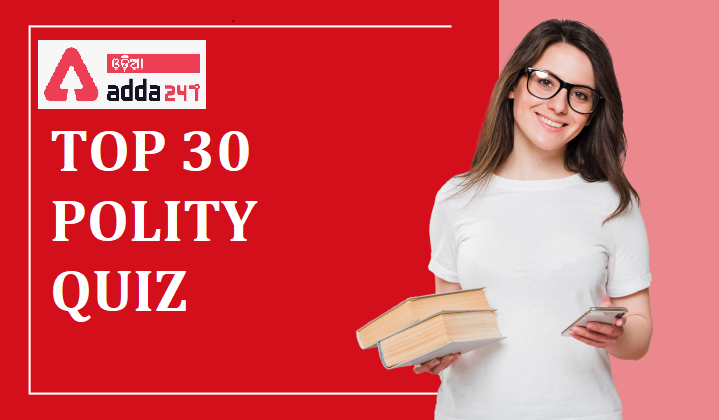At Adda247, we are providing questions for the General Awareness section. Today, in this quiz we shall study Polity Questions. Here’s a blog of the Top 30 Indian polity Quiz for Competitive Exams. As you know polity questions and answers are the very useful topic for Banking, SSC, OPSC & Other state exams Study and Score great marks in the Exam.
Q1. Which amendment of the Constitution of India increased the age of retirement of High Court judges from 60 to 62 years?
- 10th
- 12th
- 15th
- 245th
S1. Ans: [C] 15th
Q2. How many times a person can be elected as the President of India?
- One time
- Two times
- Three times
- No bar
S2. Ans: [D] No bar
Q3. Which of the following provision needs a special majority in Parliament?
- Change in Fundamental Rights
- Creation of New States
- Abolition of Legislative Councils in State
- Rules and Procedures in Parliament
S3. Ans: [A] Change in Fundamental Rights
Q4. Who is the custodian of Contingency Fund of India?
- The Prime Minister
- Judge of Supreme Court
- The President
- The Finance Minister
S4. Ans: [C] The President
Q5. India has taken the concept of ‘Judicial Review’ from which country’s constitution?
- United States
- United Kingdom
- Canada
- Ireland
S5. Ans: [A] United States
Q6. In the Indian Parliamentary System, ‘Vote on Account’ is valid for how many months (except the year of elections)?
- 2 months
- 3 months
- 6 months
- 9 months
S6. Ans: [A] 2 months
Q7. Comptroller and Auditor General of India is appointed for how many years?
- 2
- 4
- 6
- 5
S7. Ans: [C] 6
Q8. Which of the following Amendments is also known as the ‘Mini Constitution’ of India?
- 7th Amendment
- 42nd Amendment
- 44th Amendment
- 74th Amendment
S8. Ans: [B] 42nd Amendment
Q9. Which of the following right has been removed from fundamental rights and converted to a simple legal right?
- Right to life and personal liberty
- Right to property
- Right to education
- Right to freedom of religion
S9. Ans: [B]
Q10. Who among the following were the members of the drafting committee of the constitution?
- Vallabhbhai Patel
- Jawaharlal Nehru
- Alladi Krishnaswami Aiyar
- Rajendra Prasad
S10. Ans: [C] Alladi Krishnaswami Aiyar
Q11. How many members of upper house (Rajya Sabha) can be nominated by President of India?
- 10
- 12
- 14
- 16
S11. Ans: [B] 12
Q12. Which of the following is justiciable in nature?
- Fundamental Duties
- Directive principles of state policy
- Fundamental Rights
- None of these
S12. Ans: [C] Fundamental Rights
Q13. In the Indian constitution, the method of election of President has been taken from which country?
- Britain
- USA
- Ireland
- Australia
S13.Ans: [C] Ireland
Q14. How many types of writ are there in the Indian Constitution?
- 5
- 4
- 3
- 2
S14. Ans: [A] 5
Q15. Part IV of Constitution of India deals with which of the following?
- The Union
- The States
- Fundamental Rights
- Directive Principles of State Policy
S15. Ans: [D] Directive Principles of State Policy
Q16. What is the literal meaning of the term “Quo-Warranto”?
- We command
- To forbid
- By what authority (or) warrant
- None of these
S16. Ans: [C] By what authority (or) warrant
Q17. How many Fundamental Duties are mentioned in Indian constitution?
- Five
- Seven
- Nine
- Eleven
S17. Ans: [D] Eleven
Q18. The members of the Rajya Sabha are elected by the_____
- Elected members of legislative assemblies of the states
- Members of the Lok Sabha
- People
- Members of the legislative council
S18. Ans: [A] Elected members of legislative assemblies of the states
Q19. A proclamation of emergency must be placed before the Parliament for its approval
- Within 1 month
- Within 2 months
- Within 6 months
- Within 1 year
S19.Ans: [A] Within 1 month
Q20. Which of the following authority is elected on the basis of proportional representation in India?
- Prime Minister
- President
- Governor
- Lok Sabha Speaker
S20. Ans: [B] President
Q21. Which of the following is not provided by the constitution of India?
- Election Commission
- Finance Commission
- Public Service Commission
- Planning Commission
S21. Ans: [D] Planning Commission
Q22. Which of the following is not an essential element of a federal form of government?
- Written Constitution
- Independent Judiciary
- Division of Power
- Separation of Powers
S22. Ans: [D] Separation of Powers
Q23. Who recognizes the political parties in India?
- President of India
- Election Commission of India
- Ministry of Law and Justice
- Speaker of the Lok Sabha
S23.Ans: [B] Election Commission of India
Q24. According to Article 85 ( 1) of the Constitution of India, the Lok Sabha must meet at least how many times?
- Three times each year with no more than four months between sessions.
- At least once a year.
- Four times each year,
- Twice a year with no more than six months between sessions.
S24. Ans: [D] Twice a year with no more than six months between sessions.
Q25. Choose the correct statement stated in the Constitution of India :
- India, that is Bharat, shall be a Federation of States.
- India, that is Bharat, shall be a Union of States.
- India, that is Bharat, shall be a Quasi-federal State.
- India, that is Bharat, shall be a Unitary State.
S25. Ans: [B] India, that is Bharat, shall be a Union of States.
Q26. _________ can give the Union parliament power to make laws on matters included in the State list.
- Ministry of Defence
- Prime Minister’s Office
- Securities and Exchange Board of India
- Rajya Sabha
S26. Ans: [D] Rajya Sabha
Q27. In India, the concept of single citizenship is adopted from
- The French Constitution
- The Swiss Constitution
- The Constitution of United States of America
- The British Constitution
S27. Ans: [D] The British Constitution
Q28. Name the Constitutional Amendment Act that was passed to provide free and compulsory education of all children between 6 and 14 years of age.
- 86th Amendment Act.
- 84th Amendment Act.
- 83rd Amendment Act.
- 82nd Amendment Act.
S28. Ans: [A] 86th Amendment Act.
Q29. Which Constitutional Amendment Act discontinued the Anglo-Indian reserved seats in the Parliament and State legislatures?
- 104th Amendment Act.
- 103rd Amendment Act.
- 102nd Amendment Act.
- 101st Amendment Act.
S29. Ans: [A] 104th Amendment Act.
Q30. The Chairman of the Public Accounts Committee of Parliament is appointed by the
- Speaker of the Lok Sabha.
- Prime Minister of India.
- President of India.
- Chairman of the Rajya Sabha.
S30. Ans: [A] Speaker of the Lok Sabha.








